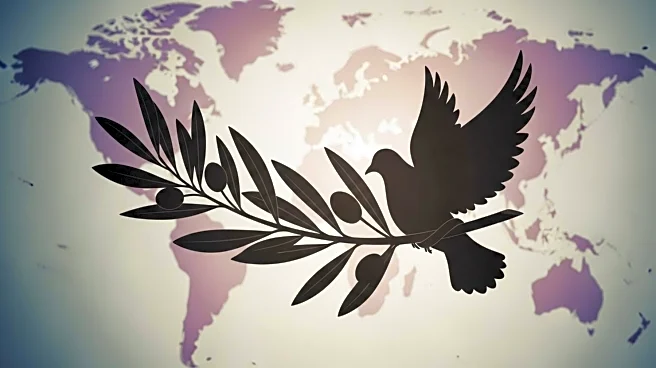What's Happening?
The United Kingdom, along with several other countries, has recognized the State of Palestine, aiming to support a two-state solution to the Israel-Palestine conflict. This recognition is largely symbolic, intended to signal international support for Palestinian self-determination amidst ongoing violence in Gaza. Despite this diplomatic move, the Palestinian Authority struggles to exercise full control over territories occupied by Israel since 1967. The recognition is based on provisional borders from the 1967 lines, with future negotiations expected to define these borders. The move highlights the growing international frustration with the stalled peace process and the continuation of the conflict.
Why It's Important?
The recognition of Palestine by the UK and other countries strengthens the Palestinian claim to independence and increases diplomatic pressure on Israel and the United States, who oppose Palestinian statehood. This symbolic gesture could enhance Palestine's standing in international forums, such as the International Criminal Court, although it does not materially change the situation on the ground. The recognition isolates Israel and the U.S. diplomatically, potentially influencing future negotiations. However, without concrete actions to advance peace talks, the recognition remains largely symbolic, underscoring the need for a negotiated settlement between Israel and Palestine.
What's Next?
For the recognition to have practical significance, it must be accompanied by efforts to end the conflict in Gaza, return hostages, and provide humanitarian aid. A transitional regime for governance and security in Gaza is necessary until the Palestinian Authority can resume control. The United States and other international actors must actively push for renewed peace negotiations. The situation requires immediate attention to prevent further escalation and to move towards a lasting resolution.
Beyond the Headlines
The legal basis for recognizing Palestine is debated, with the Montevideo Convention's criteria for statehood being scrutinized. The recognition highlights the complex legal and diplomatic challenges in achieving Palestinian statehood. The historical context of the UN partition resolution and subsequent conflicts underscores the enduring challenges in resolving the Israel-Palestine conflict.










